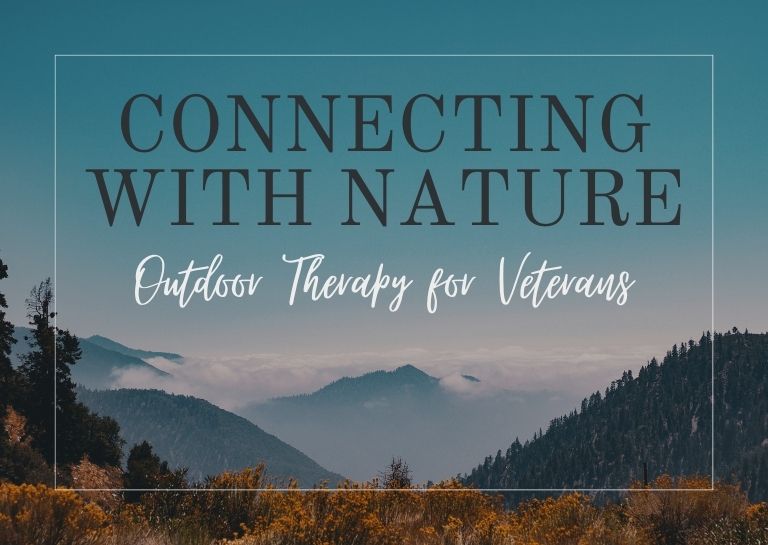
contributed by Sylvia Trein
Some may not think of nature as powerful therapy, but research shows that outdoor therapy activities effectively reduce symptoms of PTSD, anxiety, and depression. The VA, the Smithsonian, and nonprofits such as the Veterans Outdoor Foundation are helping veterans and their caregivers rethink treatment for those who have difficulty reacclimating to civilian life after deployment and who are dealing with residual anxiety and depression.
Therapy for veterans can hit many snags. Some individuals are resistant to a more traditional, office-based “talk” approach, which can feel too vulnerable and/or carry social stigma that is hard to shake off. Barriers such as cost or finding the right-fit therapist can also delay progress. This can all be discouraging. While mental health professionals should be the ones to diagnose conditions and prescribe treatment, they have a proven, popular option in their tool belt in the form of nature therapy.
The benefits of outdoor therapy include reducing painful symptoms of mental distress with less stigma than traditional therapy—all while increasing social support and teaching tools and strategies that veterans can use on an ongoing basis. Combat veterans who take part in wilderness therapy programs, especially group-based ones, report more peace of mind, more self-acceptance, and a stronger ability to reflect and process their emotions and experiences.
The Wounded Warrior Project has found that 1 in 3 veterans suffer from some degree of PTSD. Symptoms of PTSD include distressing flashbacks and dreams; avoidance (of thoughts, feelings, places, people, etc.); high reactivity, such as a quick temper or being easily startled; and disordered mood—feeling low or hopeless, or losing interest in once-beloved hobbies. In some cases, untreated PTSD can lead to substance abuse problems and suicidal ideation. It can also aggravate or worsen chronic health conditions like heart disease.
The WWP also found that 1 in 3 veterans do not have adequate access to mental health services. The Pew Research Center has also reported (in a 2019 study) that many veterans, particularly enlisted personnel and NCOs, did not feel well-prepared to transition to civilian life after their service.
Veterans can suffer symptoms of depression, anxiety, and PTSD for years or decades, which impacts their entire lives, from family life to career to physical health. Veteran therapy has to address complicated feelings of isolation, confusion, and trauma.
Outdoor therapy can help improve veteran depression and anxiety from many different angles. The VA’s Mental Illness Research, Education and Clinical Center (MIRECC) reports that spending time in nature can help restore our ability to pay attention by engaging our mind and senses in pleasant sights, sounds, and smells—think fresh air, birdsong, rushing rivers, and tree branches waving in the breeze. Time in nature can also help stop rumination (that is, coming back again and again to negative thoughts). Nature based therapy brings us into the present moment and into our physical bodies (mindfulness). It takes advantage of our innate preference for nature over other environments, lifting our mood simply by our surroundings.
It also exposes us to sunlight, increasing vitamin D in our bodies, as low levels are linked to depression. Being outside regulates our sleep-wake cycle, lowers heart rate, and reduces blood pressure.
Veterans’ outdoor programs take advantage of these benefits and add important elements in the form of social support and physical-psychological challenges. Wilderness expeditions (such as those organized by Veteran Expeditions, or Vet Ex) use strategic activities such as hikes and obstacle courses that veterans tackle with group support and encouragement, leading to increased feelings of accomplishment, community, and self-trust. WWP’s Project Odyssey is a 12-week program with a 5-day intensive mental health retreat, focused on healing what they call “invisible wounds” and building resilience.
Many organizations, such as Hope for the Warriors and their Team HOPE, empower disabled veterans to learn to exercise and leverage their bodies after the loss of a limb or other major injury. Through proving that they can still excel physically, these organizations help veterans process the heavy grief that comes with permanent physical change.
Some outdoor veteran programs offer rock-climbing, camping, hunting, fishing, gardening, horseback riding, surfing, swimming, flying kites, and even falconry. They can include elements such as journaling, guided imagery, or even visual art. There is something for everyone.
Nature based therapy programs present a lower-stakes opportunity for veterans to get the help they need to overcome depression, anxiety, and PTSD. They are effective and widely available through a variety of organizations. Those that specifically group veterans together for outdoor therapy offer the additional chance for participants to form relationships with others who truly understand what they are going through. The results can be increased connection—with self, with others, and with nature—peace, self-esteem, and a sense of purpose.
© 2006-2020 Military Connection, Owned by BL, LLC. All rights reserved

 Must-Reads Books about the Civil War – A Military Connection Top 10 List
Scroll to top
Must-Reads Books about the Civil War – A Military Connection Top 10 List
Scroll to top
Helping Wounded Warriors Through Science: Military Connection
Game-changing Device May Save Lives: Military Connection
Dr. Loses License for Bizarre Practices: Military Connection